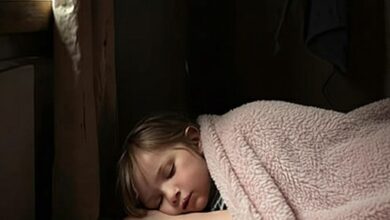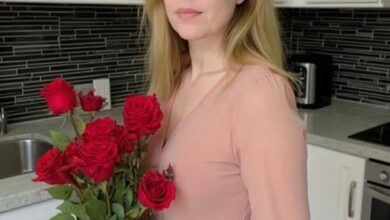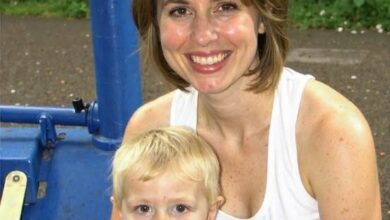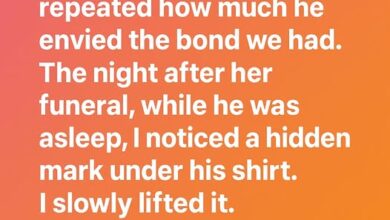Story
The Gold Earrings And The Truth They Revealed
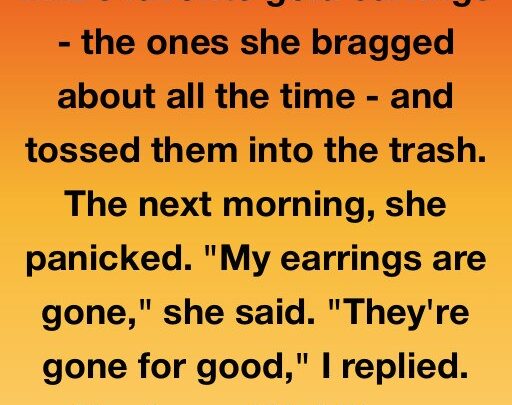
I threw them away because I wanted to hurt her.
Not break her—just make her feel, for one second, the sting she’d been handing me in small, precise doses since the day I married her son. Sanda had a talent for it: the sideways compliments, the “Are you sure you know how to cook that?” questions, the constant comparisons to women I’d never met. And those earrings—the ones she’d raise to the light at every family gathering, retelling how they were “handcrafted back home, real 18-karat”—were like tiny, glittering trophies she used to remind me I was never quite enough.
That Sunday, Raul was working late. It was just me, Sanda, and her sister, Vera. I’d made grilled fish and a crisp salad. Simple, good. Sanda pressed her lips together, nudged her plate away, and said, “When Raul was little, he liked real food. Meat. Not this… rabbit food.” Something in me snapped. I walked to the guest room, opened her jewelry box, took the earrings, and dropped them into the kitchen trash under a handful of damp coffee grounds.
Petty? Absolutely. But in the moment it felt like balance.
The next morning she stood at the doorway, wringing her hands. “My earrings are gone,” she whispered. “They’re gone for good.” I should’ve expected the theatrics. I didn’t expect her voice to crack. “Those earrings are the last thing I have from my mother.” The words landed like a stone in my gut. I was ready for a fight; I wasn’t ready for grief.
I said nothing. She blinked hard and drifted away, moving like she was trying not to fall apart. That night, when Raul came home, the confession rose to my tongue and stopped there. I swallowed it.
The house went quiet after that. Not icy—just… soft around the edges in a way that made it hard to breathe. She cooked Raul’s eggs the way he liked them and didn’t mention the earrings again. I told myself she was being dramatic. Then I started waking at 3 a.m., imagining her on the edge of the bed, holding an empty jewelry box and trying not to cry. I didn’t know if she was the kind of woman who cried. I only knew I’d never bothered to find out.
Days passed like dust in sunlight. Then, one afternoon, I found her kneeling in the garden, palms dirty, pushing marigolds into the soil. “My mother’s favorite,” she said. I asked if she wanted help. She didn’t say no. After a stretch of quiet, I asked, “Did you ever find them?” She shook her head. “No. They’re gone. I’ve accepted it.” I could have told her the truth. I didn’t. Pride is stubborn like that—it promises protection and gives you distance instead.
And then she started changing. The sharp edges dulled. She asked if I wanted to join her for groceries. She noticed my scarf and said it suited me. She laughed at something I said and it wasn’t brittle—it was warm. When Raul mentioned over a movie that his mom seemed “different lately,” I said yeah, and guilt hit like a wave I hadn’t seen coming. Was the cost of peace the loss of something precious? Had I forced it?
I decided to tell her. The very next morning, she collapsed in the kitchen.
The ambulance was a bright, cold rush. I held her hand while the siren folded the city around us. A mild stroke, the doctor said. Therapy and rest. Someone would need to help for a while. I volunteered before anyone else could speak.
For weeks, I became her shadow. I cooked. I helped with the shower. I brushed her hair and read to her when the words swam. She hated needing anyone, but she never snapped at me. Not once. One afternoon, as I rubbed lotion into her hands, she studied me over the rim of her glasses. “You’ve changed,” she said. “You too,” I answered. She nodded, then whispered, “Thank you. For everything.”
It was the right moment. “I need to tell you something. About the earrings.”
Her eyes brightened. “You found them?”
“No,” I said. “I threw them away.” The truth slid out and hung there, heavy and quiet. “I was angry. You criticized the lunch and I… broke. I’m sorry. I know sorry doesn’t fix it, but I couldn’t keep letting you grieve something I’d taken.”
She didn’t gasp. She didn’t scold. She just looked at me with a sadness that felt deeper than disappointment. “I see,” she said. We sat in that stillness until she spoke again. “They weren’t worth much,” she added softly. “Not even real gold. Gold-plated. My mother gave them to me the day I left Romania. ‘Wear these so you remember where you came from,’ she said.” She traced the lines in her palm with a finger. “I think I forgot. I wore them to feel important. Maybe that’s why I treated you like I did.” Her voice wavered. “I’m sorry too.”
We cried—awkward, honest tears that washed years of grit out of the air between us. She recovered. She moved back home. Something fragile and new took root.
She started inviting me for tea. I learned she loved marigolds because they looked like little suns in the poor corner of her childhood yard. I learned about her first love, the year she crossed an ocean with a toddler and a suitcase, how afraid she’d been to start over. I brought her a pair of earrings one day—simple, not expensive, lovely. She smiled when she opened the box. “They’re not the same,” she said, “but I like these even more.” Raul complimented them later and asked if they were the old pair. She laughed. “No. Those are gone. These have a better story.” We didn’t explain. Not every truth needs an audience.
Months later, she asked us to help with the attic. We climbed through boxes and brittle newspapers until I opened a small tea tin and felt the air shift. Inside was a velvet pouch. Inside the pouch—the earrings. Dusty, but whole.
We stared. Sanda’s hand flew to her mouth. We pieced together possibilities. Maybe Vera moved them when she borrowed the guest room mirror. Maybe Sanda tucked them away ages ago and forgot. Either way, I hadn’t thrown them away. In my fury that day, I’d tossed a look-alike pair she kept for everyday wear.
I looked at her, waiting—for anger, for relief, for something. She started to laugh. Not cruelly—brightly, like a window thrown open. “You were ready to confess for something you didn’t do,” she said, wiping her eyes. “Maybe that’s what made things right anyway.”
We kept that part between us. The world got the gentler version: lost, found, cherished. We held the complicated truth: broken, mended, changed.
I still think about the moment I believed I’d shattered something beyond repair and chose to tell the truth anyway. It didn’t bring back earrings. It brought us back to ourselves. Revenge feels sharp for about a minute and then it dulls into regret. Honesty hurts longer, then heals deeper. If I hadn’t confessed, I’d still be living in that tight, airless room pride built for me.
It turns out it was never about the earrings. It was about the story we were telling each other—and the one we decided to write next.
